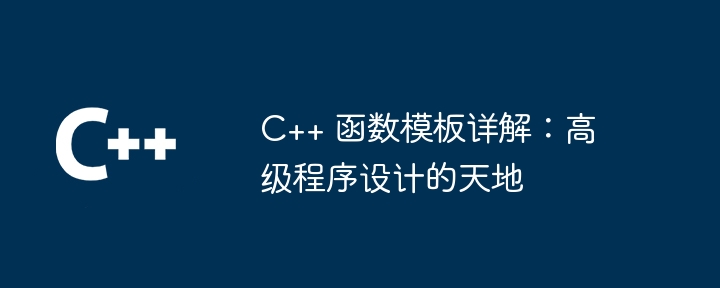
Function templates allow the creation of universal functions of multiple data types, enhancing code maintainability and efficiency. Using the type parameter T, a function template can operate on any data type without having to create different function versions. The compiler automatically infers the argument types and instantiates the appropriate function version. Practical example: The function template that counts the number of elements in an array accepts any type of array and returns the count of each unique element without modifying the code.

Introduction
Function templates are a powerful A C feature that allows you to create generic functions that can be used with different data types or number of arguments. By using function templates, you can write flexible, reusable code, making your code more maintainable and efficient.
Syntax
The syntax of a function template is as follows:
template<typename T>
T myFunction(T x, T y) {
// 函数体
}In the above example:
template<typename T> indicates that this is a function template and the parameter T is a type parameter. T myFunction(T x, T y) defines the function signature, specifying that it accepts and returns a type that is the same type as the argument T. Type parameters
Type parameters work like ordinary function parameters, but they are types rather than values. This allows you to manipulate arbitrary data types in function templates without creating different function versions.
Parameter Inference
When you call a function template, the compiler automatically infers the types of the actual parameters and instantiates the appropriate function version. For example:
int maximum(int a, int b) {
return a > b ? a : b;
}
double maximum(double a, double b) {
return a > b ? a : b;
}
template<typename T>
T maximum(T a, T b) {
return a > b ? a : b;
}In the above example, the first two maximum functions are ordinary functions that require the argument types to be specified explicitly. The last maximum function is a function template that can accept any type of data as input parameters.
Practical case: Counting the number of elements in an array
Consider an array containing different element types, and you need to count the number of each element. You can easily implement this functionality using function templates:
template<typename T>
map<T, int> countElements(const vector<T>& arr) {
map<T, int> count;
for (const T& element : arr) {
count[element]++;
}
return count;
}
int main() {
vector<int> intArray = {1, 2, 3, 4, 5, 1, 2};
vector<double> doubleArray = {1.1, 2.2, 3.3, 1.1, 2.2};
map<int, int> intCounts = countElements(intArray);
map<double, int> doubleCounts = countElements(doubleArray);
// 打印计数
for (const auto& [key, value] : intCounts) {
cout << "int: " << key << ", count: " << value << endl;
}
for (const auto& [key, value] : doubleCounts) {
cout << "double: " << key << ", count: " << value << endl;
}
return 0;
} In this example, the countElements function is a function template that accepts an array of any type and returns a map containing each Count of unique elements. Argument inference allows us to call the function on arrays of different types without modifying the code.
The above is the detailed content of Detailed explanation of C++ function templates: the world of advanced programming. For more information, please follow other related articles on the PHP Chinese website!
 What are the differences between c++ and c language
What are the differences between c++ and c language
 Recommended learning order for c++ and python
Recommended learning order for c++ and python
 Cost-effectiveness analysis of learning python and c++
Cost-effectiveness analysis of learning python and c++
 Is c language the same as c++?
Is c language the same as c++?
 Which is better to learn first, c language or c++?
Which is better to learn first, c language or c++?
 The difference and connection between c language and c++
The difference and connection between c language and c++
 C++ software Chinese change tutorial
C++ software Chinese change tutorial
 Cost-effectiveness analysis of learning python, java and c++
Cost-effectiveness analysis of learning python, java and c++




